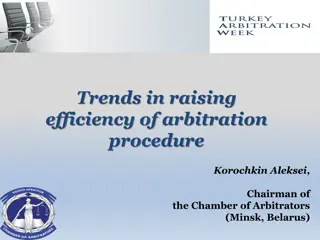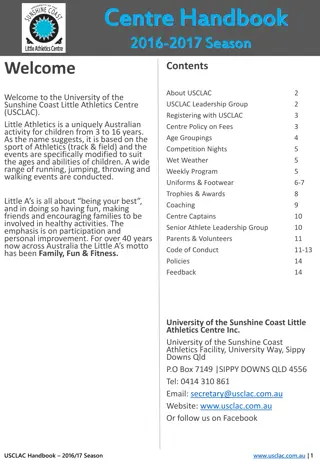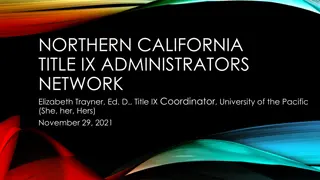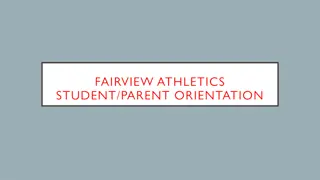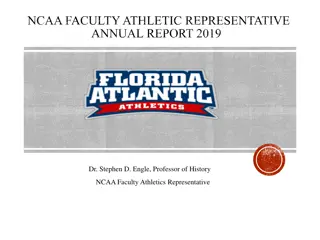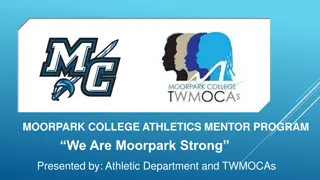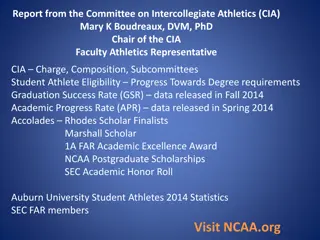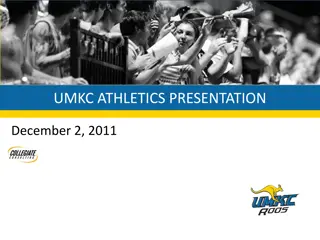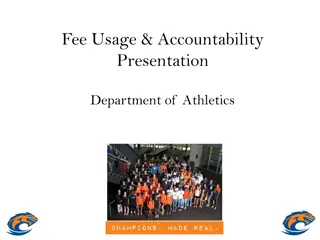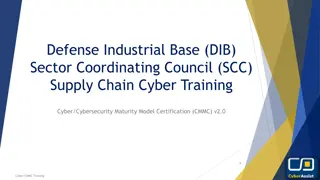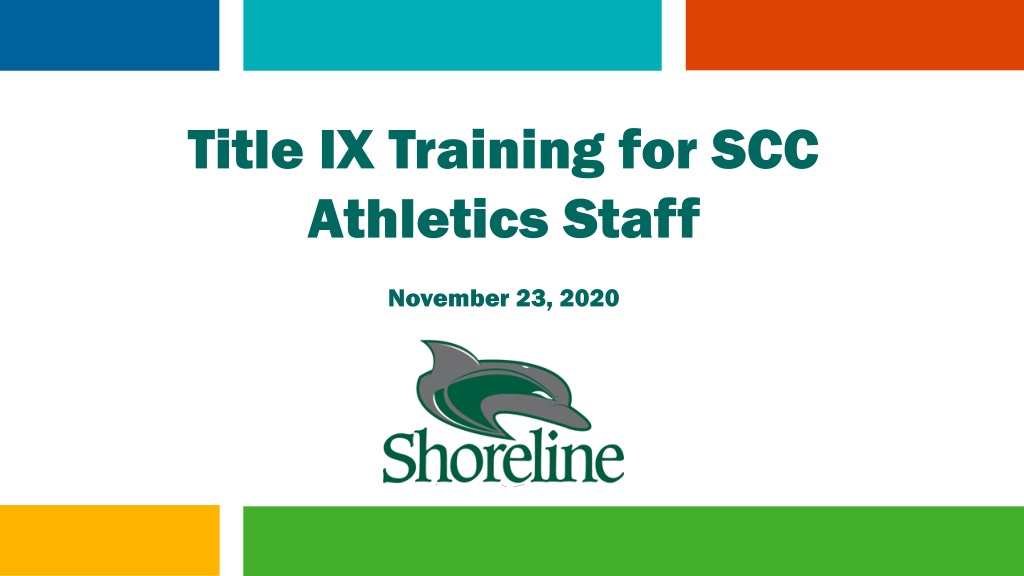
Understanding Title IX Training for SCC Athletics Staff
Explore the essential components of Title IX training provided to SCC Athletics Staff, covering responsibilities, responding to misconduct reports, and preparing for investigations. Understand the importance of addressing sexual violence on college campuses and in the workplace.
Download Presentation

Please find below an Image/Link to download the presentation.
The content on the website is provided AS IS for your information and personal use only. It may not be sold, licensed, or shared on other websites without obtaining consent from the author. Download presentation by click this link. If you encounter any issues during the download, it is possible that the publisher has removed the file from their server.
E N D
Presentation Transcript
Title IX Training for SCC Athletics Staff November 23, 2020
Todays session Learning goals Learning goals Review of Title IX Review of Title IX Our roles and responsibilities Our roles and responsibilities Responding to reports of sexual misconduct Responding to reports of sexual misconduct What to know if you are party to a Title IX investigation What to know if you are party to a Title IX investigation Apply your knowledge Apply your knowledge
Learning goals By the end of this session, you will Understand our responsibilities under Title IX as a college and as individual employees Be prepared to respond to someone who reports sexual misconduct Know what to expect if you are involved in a Title IX Investigation Be prepared to provide information about Title IX to your students and colleagues
Why are we here today? Women ages 18-24 who are college students are 3 times more likely than women in general to experience sexual violence. Male college students ages 18-24 are 78%more likely to experience sexual violence than non-students of the same age 21% of transgender students have experienced sexual violence Every 73 seconds a person in the United States is sexually assaulted. www. www.rainn rainn..org/statistics/ ..org/statistics/vistimis vistimis- -sexual sexual- -violence violence. .
Why are we here today? Students and employees who are affected by sexual misconduct can face significant barriers to education and success in the workplace: Anxiety Depression Increased use of drugs and alcohol General life disruption Trauma Trauma- -Informed Practices for Postsecondary Education: A Guide Informed Practices for Postsecondary Education: A Guide, Education Northwest. , Education Northwest. ( (https://educationnorthwest.org/sites/default/files/resources/trauma-informed-practices-postsecondary-508.pdf. Accessed on 12/15/2019) Accessed on 12/15/2019)
Why are we here today? The way we respond to a report of sexual misconduct can mean the difference between a student dropping out of school or receiving the help and support they need to recover and complete their education. It can mean the difference between a colleague remaining in their job or leaving the college.
What is Title IX? No person in the United States shall, on the basis of sex, be excluded from participation in, be denied the benefits of, or be subjected to discrimination under any education program or activity receiving federal financial assistance. Education Amendments of 1972
What does Title IX do? Mandates equity in athletics programs at all educational institutions receiving Federal funds Equitable opportunities for participation Proportional distribution of scholarships Requires equal treatment of male and female athletes around access to facilities and other benefits
What does Title IX do? Addresses sexual misconduct: Prohibits gender discrimination Prohibits sexual harassment Prohibits sexual violence Prohibits discrimination against pregnant and parenting students and employees
Title IX Requires the College to: Respond promptly and effectively when noticed of a possible Title IX violation Provide supportive measures to all parties Investigate the claim Ensure due process and fair treatment of all parties in our response Restore access to education through remedial measures Protect all parties from retaliation
Major changes in 2020: Definition of sexual harassment: Definition of sexual harassment: Quid pro quo: A Shoreline Community College employee employee conditioning the provision of an aid, benefit, or service of the College on an individual s participation in unwelcome sexual conduct.
Major changes in 2020: Definition of sexual harassment: Definition of sexual harassment: Hostile environment: Unwelcome conduct that a reasonable person would find to be so severe, pervasive, and objectively offensive pervasive, and objectively offensive that it effectively denies a person equal access to the College s educational programs or activities or College employment. severe,
Major changes in 2020: Definition of sexual harassment: Definition of sexual harassment: Definition of sexual assault now expressly includes domestic violence, dating (intimate partner) violence and stalking
Major changes in 2020: Jurisdiction: Jurisdiction: Title IX only addresses harassment that: Occurs within the United States Occurs within the context of a College education program or activity Meets the definition of sexual harassment established in the regulations
Major changes in 2020: New procedural mandates: New procedural mandates: In pursuing formal resolution of a Title IX complaint, the College must Provide an advisor to each party Allow parties and their advisors access to all relevant information gathered during the investigation Conduct a hearing to determine responsibility and, when necessary, appropriate sanctions
What is our role as employees? As representatives of Shoreline CC, we support a culture of care for our students and each other We commit to creating an environment in which sexual misconduct is unacceptable We serve as mandated reporters We serve as mandated reporters
Who is a mandated reporter? With the exception of Counselors, we are all mandated reporters If you witness or learn about sexual violence, sexual harassment or gender discrimination, you must report it to an appropriate authority. We can protect an individual s privacy, but we can t promise confidentiality.
Privacy vs. Confidentiality Confidentiality means you tell no one (with very few exceptions) Privacy means you tell only the people who need to know in order to keep the reporting party and the community safe Unless you are employed by SCC as a Counselor, you cannot promise confidentiality
How do I respond? When someone reports sexual misconduct When someone reports sexual misconduct 1. Determine if emergency services are needed (medical treatment or law enforcement response). If so, call Safety and Security (if on campus) or 911. 2. Help the person feel safe and supported 3. Let them know that you may not be able to keep what they tell you confidential
How do I respond? When someone reports sexual misconduct When someone reports sexual misconduct 4. Suggest confidential support resources (Counseling Center, Employee Assistance Program) 5. Set aside judgment 6. Avoid touching the person 7. To the extent possible, allow the person to exercise control in the situation
Keep in mind A survivor of sexual violence may be experiencing trauma. Their emotional response may be unexpected Their story may not seem plausible or they may not recall details Their behavior during and after the event may not make sense to you You don t need to decide if their story is true. You don t You don t need to decide if their story is true. You don t need to investigate. Just support them and report what you need to investigate. Just support them and report what you know. know.
How do I report a concern? If a situation requires an urgent response, call Safety and Security - 206-235-5860 (24/7/365) or 911. If the situation is not urgent: Contact the Title IX Coordinator File a report online (https://www.shoreline.edu/title-ix/) Tell your supervisor (being mindful of parties privacy) All of the above!
After you report a concern The Title IX Coordinator contacts the parties involved Interim supportive measures are arranged for both parties as needed The Title IX Coordinator works with the complainant to identify the appropriate path to resolution If a formal complaint is pursued, it may be resolved informally or through the hearing process Regardless of the path to resolution, you may never Regardless of the path to resolution, you may never know the outcome. know the outcome.
Creating a culture of care Know about campus resources Counseling Center, Safety & Security, Title IX Coordinator Be familiar with College policy and Title IX grievance procedures Include language on your syllabus or department web page about Title IX Be an active bystander
Creating a culture of care Take care of yourself! Take care of yourself! Recognize the signs of secondary trauma increased anxiety, jumpiness, irritability, feeling hopeless about work, intrusive thoughts, etc. Establish clear boundaries Talk through emotions with a trained counselor or other supportive person Washington State Employee Assistance Program: Washington State Employee Assistance Program: www.eap.wa.gov www.eap.wa.gov
If you are party to a Title IX complaint Cooperate fully with the investigation Be prepared to present all relevant information documentation, names of potential witnesses, etc. Expect the investigation to take some time (at least 2 months) Know that the investigation records may be subject to public disclosure
If you are party to a Title IX complaint You have the right to: You have the right to: Participate in a fair and equitable process Have union representation at all meetings if you are a represented employee Present evidence on your own behalf Ask questions about the process at any time Review all relevant evidence gathered in the investigation
Putting it all together Scenario: You are a coach and a student on your team tells you that another student on the team has been asking them out and won t take no for an answer. Yesterday the other student sent them an explicit photo of themself. The first student is uncomfortable, but they tell you they don t want to make a big deal of it. How will you respond?
Putting it all together Talking points exercise: If a student or colleague came to you directly to report sexual misconduct, what are three key things you would want to communicate to them?
Conclusion Did we accomplish our learning goals? Is there anything else you would like to discuss today? Do you have any questions?
Learning goals By the end of this session, you will Understand our responsibilities under Title IX as a college and as individual employees Be prepared to respond to someone who reports sexual misconduct Know what to expect if you are involved in a Title IX Investigation Be prepared to provide information about Title IX to your students and colleagues
Learn more: Shoreline CC Title IX web page: https://www.shoreline.edu/title-ix/ U.S Department of Education: https://www2.ed.gov/policy/rights/guid/ocr/sex.html American Association of University Women (AAUW): https://www.aauw.org/title-ix/
Contacts Tricia Lovely Tricia Lovely Title IX/EEO Coordinator Title IX/EEO Coordinator tlovely@shoreline.edu tlovely@shoreline.edu 206 206- -533 533- -6746 6746 Counseling Center Counseling Center 206 206- -546 546- -4594 4594 Campus Safety and Security (24x7) Campus Safety and Security (24x7) 206 206- -235 235- -5860 (campus extension 4499) 5860 (campus extension 4499)




